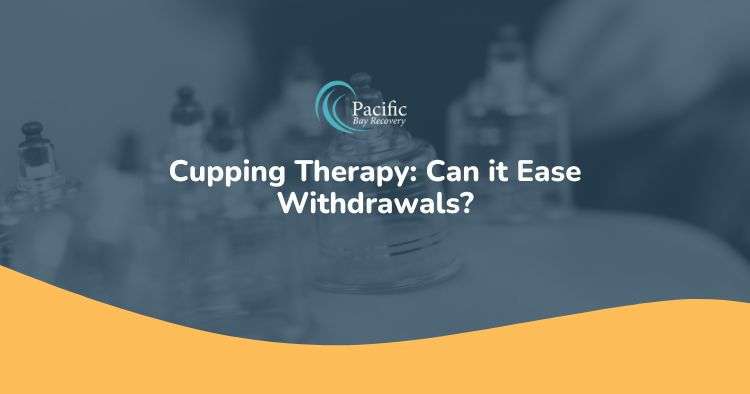Cupping therapy is an alternative medicine form where the therapist places cups on the skin to create a suction. Users get it done for many reasons, which include assisting with inflammation, pain, well-being, relaxation, and blood flow, and as a type of deep tissue massage.
Supporters of cupping therapy think that wet cupping extracts harmful toxins and substances from the body in order to promote healing.
What Are Drug Treatment Options That Are Best With Cupping Therapy?
Usually, the right detox services include some type of treatment for pain management. Natural pain management is an important part of detoxification, as pain is a common symptom. Instead of taking drugs, the ones in drug detoxification may use cupping therapy as a natural remedy for pain.
Choosing The Best Detox Clinic For Your Withdrawals
Pacific Bay Recovery is a detox clinic in San Diego. Our staff also provides addiction therapies that assist patients in naturally detoxing from drugs. As a matter of fact, we use Eastern medicine therapy solutions in our treatment programs. We have the goal of helping our patients focus on detox and reduce stress.
At Pacific Bay Recovery, we pride ourselves on the numerous special services we offer. The majority of centers only concentrate on medical detoxification. We provide a lot more, which includes:
Stages Of Relapse And How To Avoid It
After finishing treatment, one of the biggest fears a lot of newly recovering addicts and alcoholics face is relapse. It’s very common, almost expected for those who are trying to beat an addiction. A lot of people go through several relapses before successfully maintaining recovery in the long term. Relapsing from drugs or alcohol happens when a person is abstinent from their choice of substance or is in recovery and they go back to their prior substance use.
There are 3 stages of relapse that include:
- Emotional
- Mental
- Physical
Let’s explore these below:
Emotional Relapse
During the stage of emotional relapse, the individual isn’t actively considering using alcohol or drugs. But their behaviors and emotions might be setting them up for future relapse.
In order to keep a relapse from happening, it’s important that you recognize that you’re in the emotional relapse phase and to change your behavior immediately. If you are feeling anxious, start to implement deep breathing methods. Denial is common in the stage of emotional relapse. When someone has been in the emotional relapse phase for a while, they start feeling uncomfortable in their own skin. It results in feeling irritable, restless, and discontent. Unfortunately, because of fear of failure or judgment, many don’t share how they’re feeling once this happens. But sharing how you’re feeling is key in this stage. If you do not start to practice self-care, you’ll become tired. When you are tired, you’ll be looking for an escape. As the tension accumulates, a person becomes at higher risk of moving into mental relapse, which is phase two.
Mental Relapse
Once you choose not to work on any symptoms or signs of the emotional phase, there’s a greater risk of transitioning to mental relapse, which is the second stage of relapse. When someone is in mental relapse the person is at greater risk for physical relapse. Part of the person wants to use drugs or alcohol, while the other part does not. Fantasizing about substance use isn’t uncommon during this phase. As people dive deeper into the stage of mental relapse, their relapse cognitive resistance decreases, and their need to escape is increased. It’s vital to bear in mind that periodic considerations of using are normal during early recovery, yet the thoughts occurring in mental relapse differ, as they’re thoughts of making a choice to use instead of a fleeting thought of using.
Methods for handling mental relapse include:
- Speaking with a trusted peer
- Taking everything one day at a time
- Using relaxation techniques such as meditation and deep breathing
Physical Relapse
Once someone does not take the time to address and acknowledge the symptoms of mental and emotional relapse, it won’t take long to spiral down the road to physical relapse. That includes the act of consuming alcoholic beverages or using other types of drugs. The key includes immediately reaching out for assistance if you discover yourself in physical relapse to cease the vicious pattern of addiction before it’s too late.
Reach Out For Help Right Now!
If you’re able to recognize the early signs of mental or emotional relapse and understand the preventative strategies and symptoms to turn your journey around, you will have the ability to catch yourself before it is too late. Help is available, whether you have reached the physical relapse stage or not. If you discover yourself in any of the three relapse stages, there’s help available. Contact Pacific Bay Recovery at (619) 350-8220 to discuss your options for treatment.


